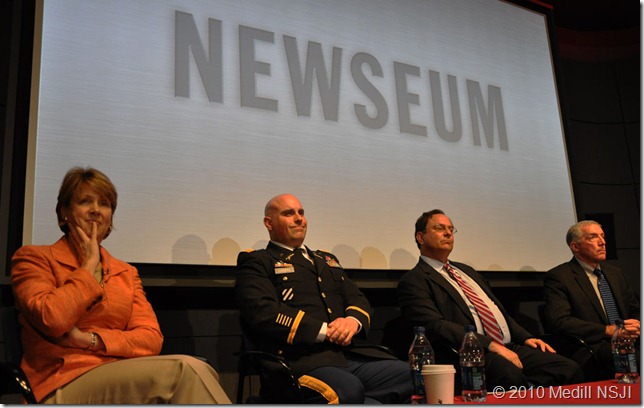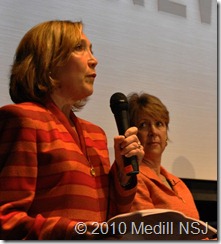By SARAH CHACKO | Medill News Service
WASHINGTON — The Department of Defense’s top spokesman assured reporters that the Pentagon would provide as many on-the-record briefings as possible on military issues, but that some policy issues will have to remain on background. A recent briefing on the military’s Don’t Ask, Don’t Tell policy was an example of such a policy issue, said Assistant Secretary of Defense for Public Affairs Doug Wilson at an Oct. 28 panel discussion sponsored by the Medill National Security Journalism Initiative at the Newseum.
Of interest
Video archive of the panel
Podcast of the panel “The decision to engage on that issue was made; we wanted to provide press with as much context of what the Pentagon was doing in light of the uncertainty as we possibly could,” he said. But the White House, Congress and the courts will determine that policy so the Pentagon was not “in control” of that policy issue, Wilson said.
Wilson (left) said that the Pentagon tries to provide knowledgeable sources to reporters, especially after adopting a new general rule of “know of what you speak” and “find out what you don’t know.”
Wilson, who has been head of the Defense Department’s office of public communications for less than a year, fielded most of the questions from an audience largely made up of reporters and journalism students. Other panelists included New York Times Pentagon correspondent Elisabeth Bumiller, retired Maj. Gen. Paul Eaton, who now works as an adviser to the National Security Network, and Maj. Kirk Luedeke, who worked with social media and bloggers for the Army in Baghdad.

Panelists, L-R: New York Times Pentagon correspondent Elisabeth Bumiller; Maj. Kirk Luedeke, a former executive officer from the Army Public Affairs Center; Assistant Secretary of Defense for Public Affairs Doug Wilson;, and retired Gen. Paul Eaton, who now works with the policy focused National Security Network. Staff Photo/Sarah Chacko
Bumiller pressed Wilson for a more definitive stance on when background briefings, in which speakers provide information to reporters but are not quoted by name or otherwise directly identified, will be used.
The panel also discussed the ramifications of classified military documents published by the website WikiLeaks. The site recently released thousands of U.S. military documents on Iraq and Afghanistan. “WikiLeaks is the template for arrogance, self-righteousness and naiveté,” Wilson said. Media outlets that saw the most recent documents in advance, including The New York Times, Qatar-based al-Jazeera and the Guardian in London, report that they show U.S. officials ignored numerous cases of abuses and torture inflicted on civilians by Iraqi soldiers. The documents also add hundreds of unknown civilian deaths to the war count.
Bumiller responded to Wilson’s claim that no public good came from the document dump by noting that while of the documents did not change the narrative of the war, they added more pertinent details to its historical record. Wilson mentioned repeatedly that WikiLeaks officials do not have the expertise to properly redact sensitive information. The documents released still have the potential of putting lives in danger, he said. “It’s a glaring example of how technology has outpaced law and policy,” he said.
In his opening comments, Wilson said communication is not just integral to coverage of policy but the making and implementation of it. But there are some unintended consequences, Wilson said, pointing to WikiLeaks, as well as the Rolling Stone article that led to the firing of Gen. Stanley McChrystal and the news of abuses of Iraqi prisoners by Americans at the Abu Ghraib prison.
The lines between fact and opinion, reality and image are becoming blurred, he said, pointing to new pressures brought by the change in media technology. “Issues that we never thought we’d have to deal with before, we’re all dealing with, oftentimes without guidance or precedence,” he said.
CSPAN video archive of the panel.







